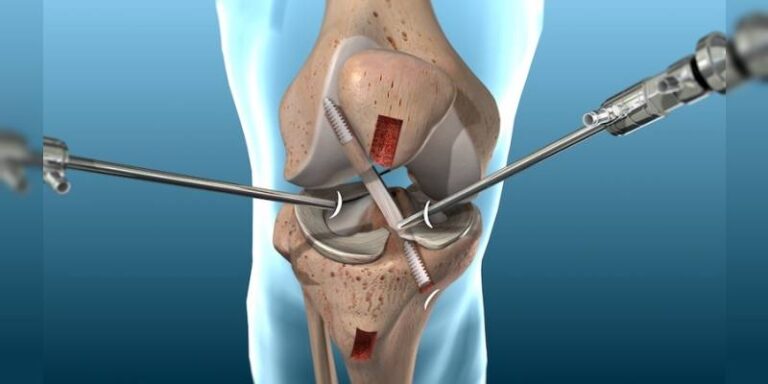Made Stress-Free Reliable Hassle-Free Convenient Pocket friendly
Request a call back
The surgery you need is
just a click away


21K +
Consultations

1180
Surgeries

100+
Partner Hospitals

10000+
Hassle-free Consultation

5000+
Smooth surgeries

500+
Expert Doctors

100+
Trusted hospitals

Affordable Knee Arthroscopy Surgery in Mumbai
Knee arthroscopy is the most common type of orthopaedic surgery. Among different types of knee surgeries, the most common procedure is arthroscopic knee replacement. Aapka Care provides advanced knee arthroscopy to treat shoulder knee problems. Book an appointment with the best orthopaedic doctor near you at Aapka Care.
- 40 min procedure
- Keyhole Surgery
- Complete Insurance Support
What is knee arthroscopy?
Knee arthroscopy is a minimally invasive procedure performed to diagnose and treat knee joint injury and other similar issues. During arthroscopy surgery, the surgeon makes 2-3 tiny incisions over the knee joint to insert an arthroscope and surgical instruments.
The arthroscope has a camera and light attached to it and helps the surgeon visualize internal structures to avoid soft tissue damage. Since the surgery involves minimal incisions, it usually promises a shorter and easier recovery period compared to open surgery.

Aapka Care - Best orthopaedic center for orthopaedic surgery
Aapka Care is one of the best surgery care providers in India for orthopaedic surgeries, including knee arthroscopy. We specialize in advanced arthroscopic surgery with help from our panel of expert and experienced orthopaedic surgeons. If you have joint pain or stiffness and have trouble performing your day-to-day activities, you should get in touch with us for US FDA-approved advanced arthroscopic surgery.
In addition to advanced treatment, we also provide other auxiliary services to the patient- such as documentation support, insurance assistance, free cab services for pickup and dropoff, complimentary meals, etc.
When is knee arthroscopy required?
Knee arthroscopy is only recommended to patients who have severe knee joint damage or degeneration and haven’t received any significant relief from conservative treatments like medicine, physical therapy, rest, injections, etc. Knee arthroscopy may be suggested for the followed conditions:
- Meniscus tears
- ACL Tear (Anterior cruciate ligament) or posterior cruciate ligament (PCL)
- Inflammation in the synovial tissue
- Damage of the articular cartilage
- Synovial chondromatosis
- Fracture of the patella
- Patellar malalignment
- Knee sepsis
Types of knee arthroscopy
- Meniscus surgery: Meniscus surgery is performed for a torn meniscus and involves a variety of techniques such as meniscus repair, meniscectomy, and meniscus reconstruction.
- ACL reconstruction: ACL reconstruction surgery is performed for a tear in the ACL ligament. The ACL is one of the most significant parts of the knee anatomy and is responsible for joint stabilization.
- Lateral release or patella realignment surgery: Lateral release procedure is performed to treat kneecap dislocation.
- Microfracture: Microfracture procedure is performed to stimulate the growth of cartilage to replace damaged tissue.
- Cartilage transfer/OATS: During cartilage transfer surgery, healthy cartilage from other parts of the body is shifted to damaged parts of the joint to improve joint movement.
How to prepare for knee arthroscopy?
If you are undergoing arthroscopic surgery, you should undergo the following preparatory steps before the surgery:
- Inform your orthopedic surgeon about your entire medical history and allergies, so that they can prepare accordingly.
- If you are taking medications like blood thinners, clotters, etc., that may interfere with healing ability or cause complications during the surgery, you may need to stop them.
- Leave your valuables like watches, jewelry, etc., at home. Wear loose-fitting and comfortable clothing to the hospital so it is easy for you to change clothes.
- You may need to fast 8-12 hours before the surgery, depending on the kind of anaesthesia your surgery is being performed under.
- You may not be able to drive yourself home after the surgery, so arrange for someone to drive you home after the surgery.
What happens during knee arthroscopy?
Before the surgery, the orthopaedic surgeon will perform a thorough diagnosis. Diagnosis before knee arthroscopy entails physical examination, along with imaging tests like X-rays, shoulder CT scans, MRI, etc.
On the day of the surgery, the surgeon may also perform a blood panel, chest x-ray, electrocardiogram, etc., to assess your vital signs and make sure you can safely undergo the surgery. Following this, the anesthesia will be administered and you will be moved to the operation theater for the surgery. Knee arthroscopy can be performed under general, regional, or local anesthesia.
The surgeon will make a few tiny incisions, called portals, over the knee joint to fill the joint with a sterile solution to improve visibility. Then an arthroscope is inserted to visualize the internal structures. Finally, with the help of the arthroscope, the surgeon will insert the surgical instruments and perform the surgery. After the surgery, the incisions will be closed and bandaged.
The surgery usually lasts less than an hour and then the patient is moved to a recovery room for post-surgery observation to ensure there are no postoperative complications.
What to expect after knee arthroscopy?
Knee arthroscopy can be performed as either a daycare procedure or require overnight hospitalization, depending on the patient’s health, type of surgery, etc. After the surgery, you may have mild pain and discomfort, that is usually manageable through over-the-counter medications and physiotherapy. During recovery, keep the incisions clean and dry.
After the discharge you should have someone drive you home. Keep your operated leg elevated and massage it with an ice pack to relieve postoperative swelling. You will be advised to start walking with support on the day of the surgery.
Perform your physiotherapy diligently and follow all your physiotherapist’s instructions. You can return to work and perform light activities within 6-8 weeks, but you should wait longer before performing heavy exercises and other strenuous activities. Do not overwork yourself as it can delay the recovery instead of benefitting it.
Another factor you should consider while recovering from knee arthroscopy is your diet. Make sure you are well hydrated and follow a healthy diet. This will boost your immune system and help your overall recovery.
What are the benefits of knee arthroscopy?
Knee arthroscopy is extremely safe and very effective in providing the patient relief from their pain without a long recovery period. Compared to conventional/open knee surgery, there are many benefits of knee arthroscopy, such as:
- Smaller incisions
- More accurate diagnosis
- Shorter surgery time
- Less postoperative pain and inflammation
- Minimal trauma to the soft tissues surrounding the surgical site
- Less postoperative pain
- Quicker recovery time
- Minimal scarring
- Fewer chances of postoperative complications
What are the risks associated with knee arthroscopy?
Knee arthroscopy is generally very safe and chances of complications is incredibly low, however, in rare cases, there is risk of certain complications like:
- Infection
- Hemorrhage with accumulation of blood in the knee
- Blood clot formation
- Stiffness of the knee joint
- Injury to the soft tissues, blood vessels, nerves, etc., surrounding the operative site
- Unexplained bruising or swelling near the operative site
Your journey with Aapka Care Health

